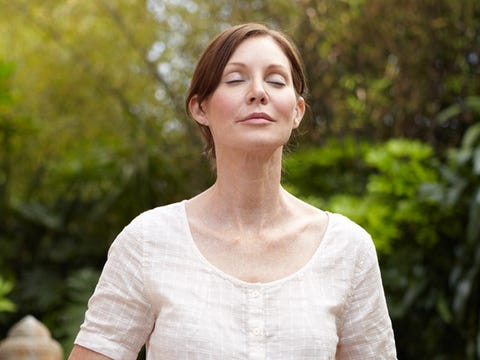In your fabulous 40s, you still feel invincible—these are great years, after all.
But subtle changes are occurring that need to be addressed before they become problems. Here are some of the most common health shifts women experience:
- Metabolism: Slowing by 2% per decade.
- Muscle: Down by 6 to 7 pounds from 10 years ago.
- Bone: Dropping by about 1% a year since your mid-30s.
- Libido: Declining because of high stress levels and hormonal changes.
- Stress: Especially high because of worries about kids, parents, health, career, and finances.
- Depression: More likely now than later in life.
Establish the following preventative habits now and you'll not only counter these changes—you'll stay healthier, sharper, more energetic, and more fulfilled for years to come.
Eat breakfast every day
Nutritionists agree that eating breakfast is essential to keeping weight down and calorie-burning metabolism up. In one study, women who ate a big breakfast lost 21% of their body weight after 8 months, compared with 4.5% for women on a low-carb diet who made breakfast their smallest meal. The healthy-breakfast eaters continued losing over time even though they ate more total calories, while the low-carb group started regaining weight after 4 months.
Reason: A solid meal at the start of the day works in concert with metabolism, which is highest in the morning, fueling activity and preventing cravings that arise when blood sugar drops
Jump-start your metabolism
Strength-training for 6 months can increase your resting metabolism (a study on men showed a boost of 7%), so you’ll burn more calories even when you’re sitting on the sofa.
Bonus: Strength-training also helps you shore up bone, maintain balance, and avoid injury—important for protecting your skeleton both now and when you’re older. Aim to exercise at least 30 minutes most days of the week.
Boost calcium and vitamin D
Both are essential for strong bones, but many experts feel current benchmarks are too low. The National Osteoporosis Foundation recommends that women in their 40s get 1,000 mg of calcium and 400 to 800 IU of vitamin D every day from foods like fortified milk or salmon, along with supplements if needed. Some nutrition experts suggest getting up to 1,000 IU a day for optimal health
4. Practice stress control
A healthy, calm heart beats faster when you breathe in, slower when you breathe out. But stress inhibits this natural "heart rate variability," triggering unhealthy changes bodywide, including increased blood pressure, less energy to the brain, lower libido, and faster cell death. "In effect, stress makes you age faster," says Claire Michaels Wheeler, MD, PhD, author of 10 Simple Solutions to Stress.
To get your heart into a healthier rhythm, breathe in through your nose for 4 beats and out for 8 at least twice a day or anytime you feel pressure. "That activates the vagus nerve that runs from the brain to the pelvis, relaxing the heart, muscles, airways, gastrointestinal tract, and blood vessels," says Dr. Wheeler.
Pump up protein
Getting foods with all the amino acids needed to form complete proteins at least twice a day boosts levels of mood-lifting neurotransmitters in the brain, which can help relieve symptoms of depression, like slow thinking and poor memory. Aim for 4 ounces of protein at each meal. Good sources include fish, eggs, and quinoa. But don’t totally skip carbs: They boost mood by increasing production of serotonin in the brain.
Go out with your girlfriends
Relaxing with friends reduces stress, boosts self-esteem, and even makes you more loving toward your partner when you get home. "Women are terrific at connecting socially but often let it fall by the wayside in their 40s because of career and family demands," says Edward Schneider, MD, emeritus dean and professor of gerontology and medicine at the University of Southern California’s Andrus Gerontology Center. Women with extensive social networks through family, work, volunteer organizations, religious groups, or hobbies have lower blood pressure, less diabetes, reduced risk of heart disease, and half as many strokes as women who are less well connected.
Source:prevention.com/life/g20496315/8-things-every-woman-in-her-40s-should-do/?slide=9












0 comments:
Post a Comment